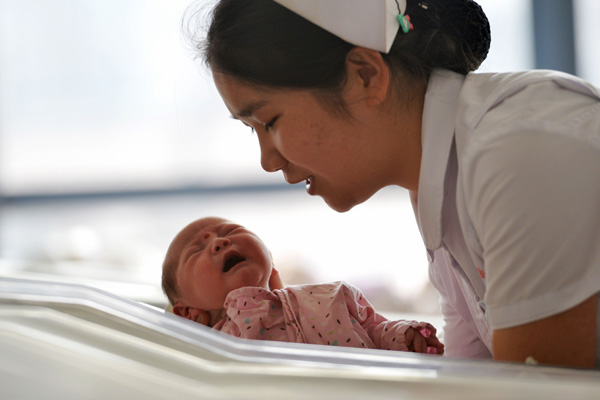Population drop spurs call for focus on quality


China's population fell by about 2 million last year, prompting experts to say that, with continued but mild declines likely in the foreseeable future, more attention should be paid to improving the quality of human resources and implementing fertility support measures.
The number of babies born last year went down by about 540,000 year-on-year to 9.02 million, according to data released on Wednesday by the National Bureau of Statistics. With 11.1 million deaths recorded last year, the total population dropped by 2.08 million to around 1.41 billion.
Meanwhile, the proportion of the working-age population — those ages 16 to 59 years old — decreased slightly year-on-year to 61.3 percent in 2023, while the proportion of people age 60 and older rose by 1.3 percentage points to 21.1 percent.
The decrease in total population last year aligned with demographers' predictions. Due to fewer women of childbearing age, a low willingness to have babies and delays in marriage — coupled with the effects of COVID-19 — China's birthrate has been falling gradually.
These contributed to the historic drop in total population that was recorded in 2022.
"The general, long-term trend in China is that we will see a steady decline in total population, but it is also important to note that global fertility is falling and modernized development will inevitably result in an aging society and low birthrates," said He Dan, director of the China Population and Development Research Center.
She said that despite the decrease in population, the total number remains massive and the quality of the population is now a more important criterion than the number in assessing demographics. "It is necessary to take a comprehensive approach that incorporates quality, structure and distribution of population when evaluating population development," she added.
Yuan Xin, a professor at Nankai University's School of Economics and vice-president of the China Population Association, said it is projected that by 2050, China will still have 1.2 to 1.4 billion people — accounting for 14 to 18 percent of total global population.
Wang Jinying, a demographer at Hebei University, said the education levels of the working-age population and of the entire population have both markedly increased in the past two decades.
"In particular, the number of talent with a master's degree spiked tenfold from 2000 to 2020," he said. "The average life expectancy also rose from 71.40 to 77.9 years during that period."
"With great improvements in education and health, China's human capital has increased substantially, helping drive a steady supply of labor and high-quality economic development," he added.
However, experts have also warned of a considerable downfall in the population in the longer term due to the lack of concrete steps to encourage births.
In July 2021, the central leadership released a decision that allows all couples to have three children and strengthens fertility support, prompting the rollout of a variety of local policies to encourage births.
He, director of the China Population and Development Research Center, said that these policies have yielded positive results, including improvements in prenatal and postnatal care and an increase in the number of babies born as a second or third child. But the policies have not fully met the demands of the public.
"The current fertility level in China stands around one (birth per woman of childbearing age), and nearly 40 percent of fertility intentions are not realized, primarily due to lack of housing and nursery care services, high education costs and infertility conditions, among other factors," she said. "These problems can be addressed through proactive action and policy interventions."
"The younger generation's perception on marriage and childbearing is moldable, and it is important for us to help them foster a positive attitude toward getting married and having children, and give them support," she said, adding that the convention of starting a family and having children over a lifetime is still widely accepted.
She noted that to build a sound fertility support system, practical problems such as steep housing costs, anxiety over education and the burden of medical care should be tackled. It is vital to expand the coverage of maternity insurance, elevate the system for child care support and fertility health protection from the local to national level, and have legal statutes in place to ensure their implementation, she said.




